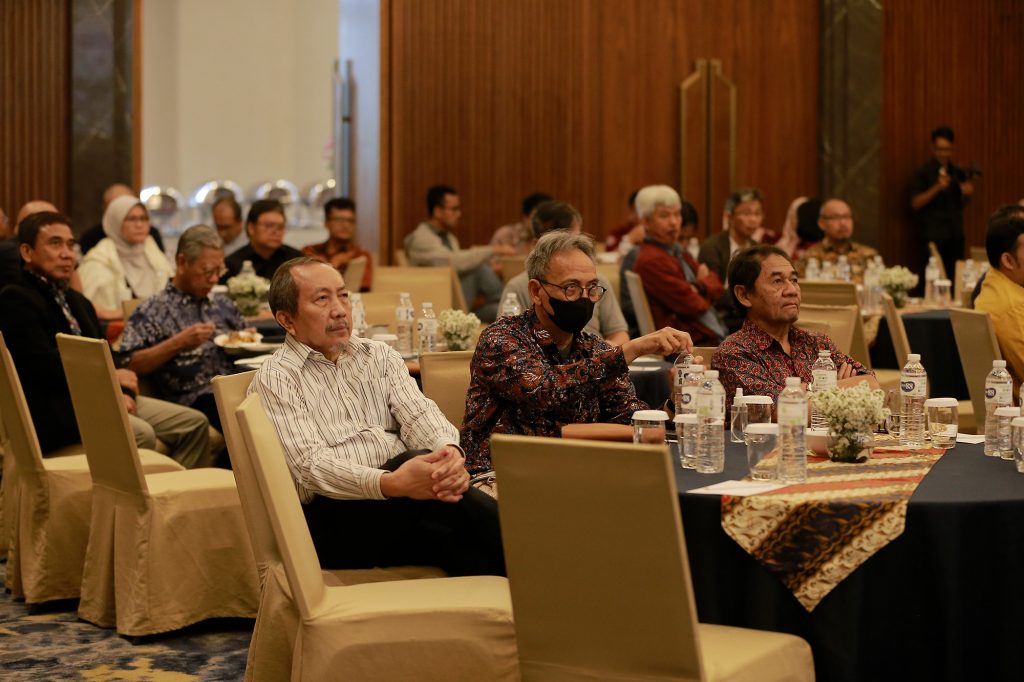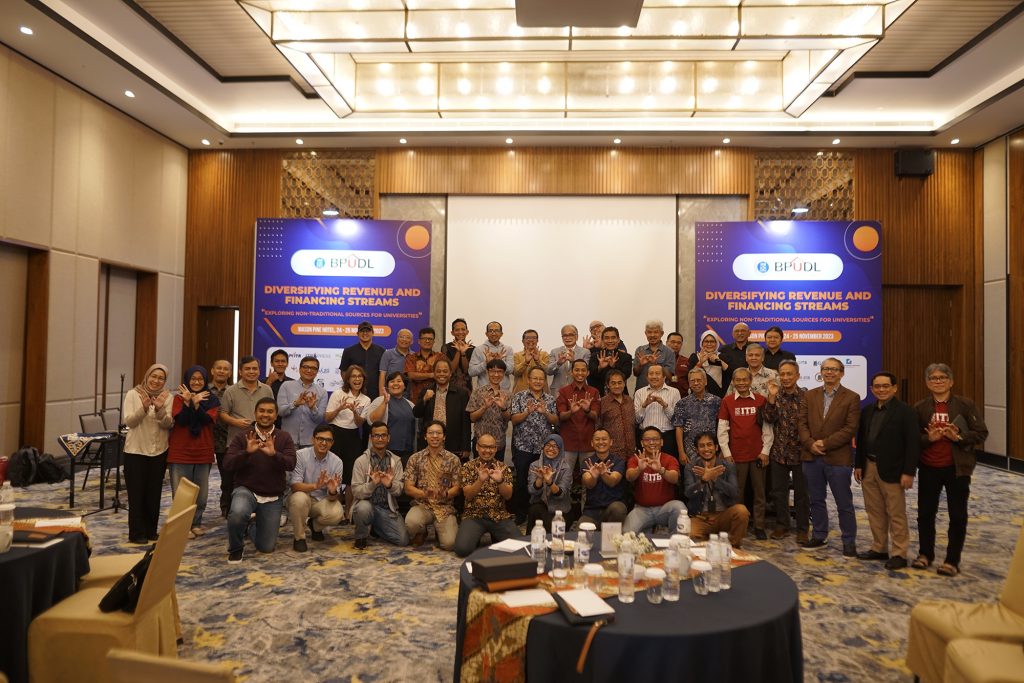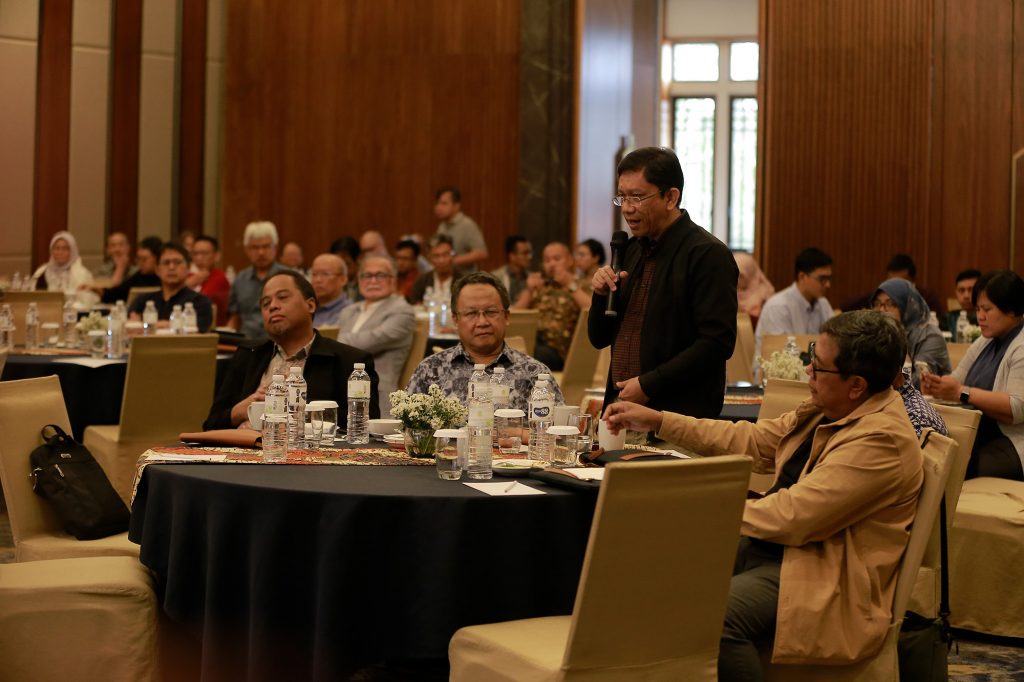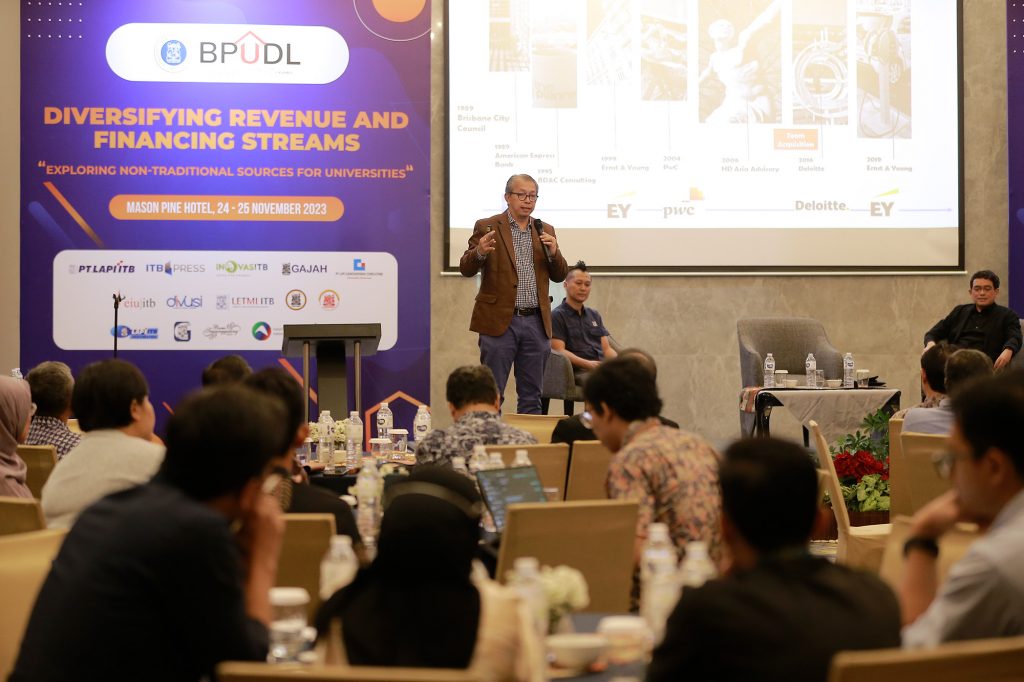BPUDL ITB recently hosted a seminar titled “Diversifying Revenue and Financing Streams: Exploring Non-Traditional Sources for Universities” (25/11/2023). This event attracted attention from ITB stakeholders, highlighting the urgent need for universities to deliver quality education and secure their financial stability in a rapidly changing environment. The seminar brought together a diverse group of experts and industry professionals, providing a rich platform for sharing insights on how universities can expand their revenue and funding sources. Key topics included leveraging unconventional funding methods and fostering new business ventures within the university context.
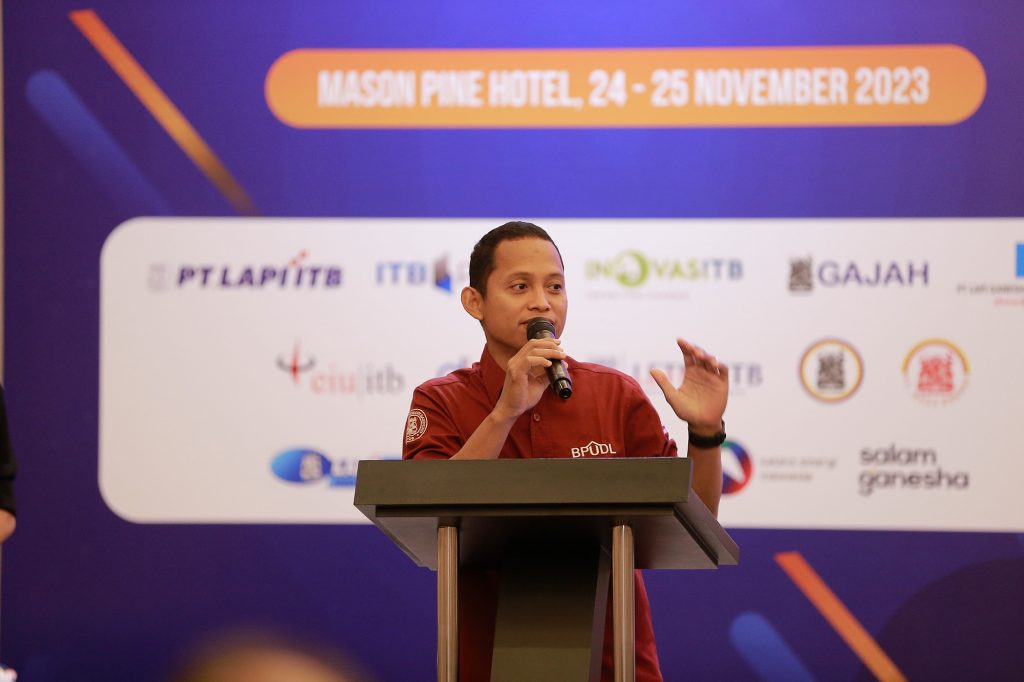
Ahmad Faizal, Secretary of BPUDL ITB, opened the event, which was attended by ITB leaders, faculty deans, business unit directors, and representatives from other universities. Faizal emphasized the seminar’s aim to enhance synergy among ITB units like LPPM, LPIK, and LPIT, focusing on monetizing assets, knowledge, and expertise as revenue streams. He proudly shared business unit’s financial achievements, with revenues reaching approximately 300 billion rupiah in fiscal year 2022 and a goal to increase this to 1 trillion rupiah soon. He also highlighted ITB’s strategy as a PTNBH (State University Legal Entity) to independently optimize resources beyond state budget funding.
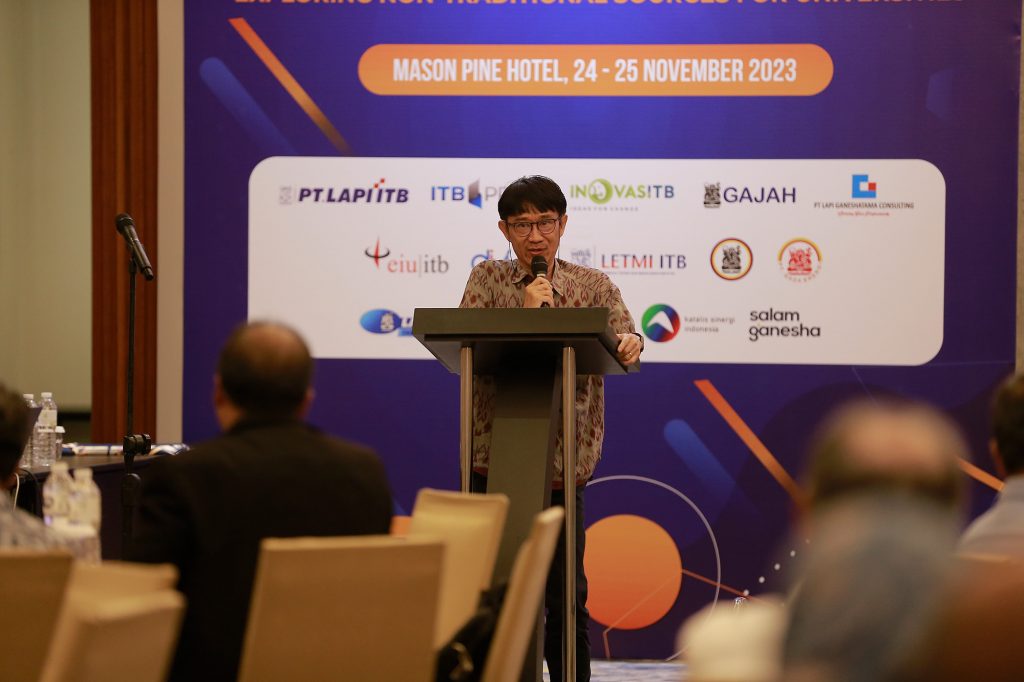
Faizal’s statement was further reinforced by Prof. Hendra Gunawan, Chair of the ITB Internal Supervisory Unit. In his remarks, Prof. Gunawan emphasized the importance of effectively managing business units as a vital source of income for ITB. He pointed out that ITB cannot continually rely on traditional funding sources such as government allocations and UKT (Single Tuition Fee) payments. The need for ITB to diversify its revenue streams, highlighting the strategic significance of the seminar’s discussions in identifying and developing alternative financial resources for the university. Prof. Gunawan’s insights added depth to the seminar’s theme, aligning with the overall goal of enhancing ITB’s financial independence and sustainability in the changing landscape of higher education.
In the seminar’s first session, a standout presentation was delivered by Bernardus Djonoputro, Head of the Metropolitan Rebana City. He focused on strategies for competing with the renowned “big four” consulting firms, highlighting this as a vital benchmark for ITB. Djonoputro emphasized the crucial role of professional human resources in this competitive scenario. He pointed out that for ITB to excel and maintain a competitive edge, it must invest in nurturing a workforce that is not only skilled but also adaptable and innovative, mirroring the standards set by leading consulting firms. This approach, according to Djonoputro, is essential for ITB to thrive in both academic and business arenas.
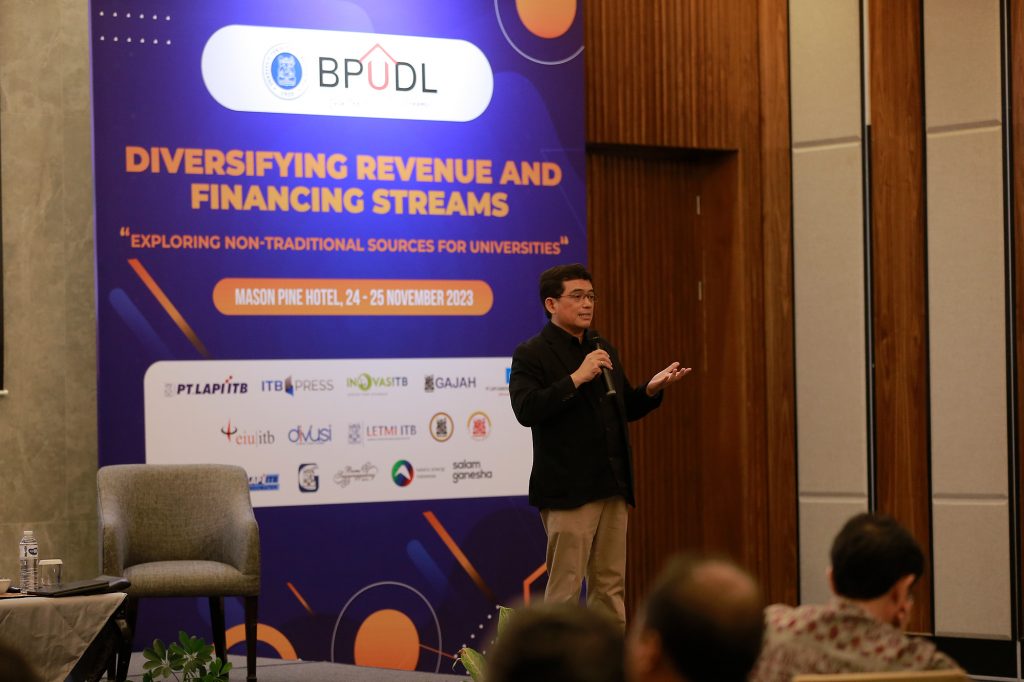
Wahid Sutopo, CEO of The Indonesia Infrastructure Guarantee Fund (IIGF), took the stage as the second speaker. He shed light on the implementation of innovative financing strategies for university infrastructure development, with a specific focus on Public-Private Partnerships (PPP). Sutopo’s presentation delved into the concept of creative financing as a means to leverage university assets effectively. He outlined how engaging in PPPs could provide universities like ITB with the necessary capital and expertise to enhance their infrastructure while minimizing financial burdens. This approach, as explained by Sutopo, is a strategic move to not only improve the physical facilities but also to foster a more robust financial ecosystem for the university, ensuring sustainable growth and development in the long term.
The second session, led by M. Hariyadi Setiawan, Director of PT LAPI, included a presentation by Sandhy Widyasthana, CEO of MDI Singapore. Widyasthana shared how leading global universities, such as Stanford, have strategically invested their endowment funds in startups, demonstrating a forward-thinking approach in university financing. During his talk, Widyasthana presented the key pillars of digital transformation and explain his venture approach of ‘Build, Borrow, and Buy on his investment perspectives.’ He elaborated on how these principles guide universities in navigating the complex landscape of digital technology and business innovation. Additionally, Widyasthana addressed a common misconception about startups being at a ‘sunset’ phase, highlighting that this phenomenon is not exclusive to new companies but is also prevalent among established corporations. His discussion underscored the importance of adaptability and strategic investment, both in startups and in traditional firms, to stay relevant and competitive in today’s rapidly evolving business world. He then elaborated on the concept of investing in startups, emphasizing that it extends beyond mere financial contribution. He highlighted the critical role of synergy in such investments, where the value significantly escalates beyond the initial financial gains.
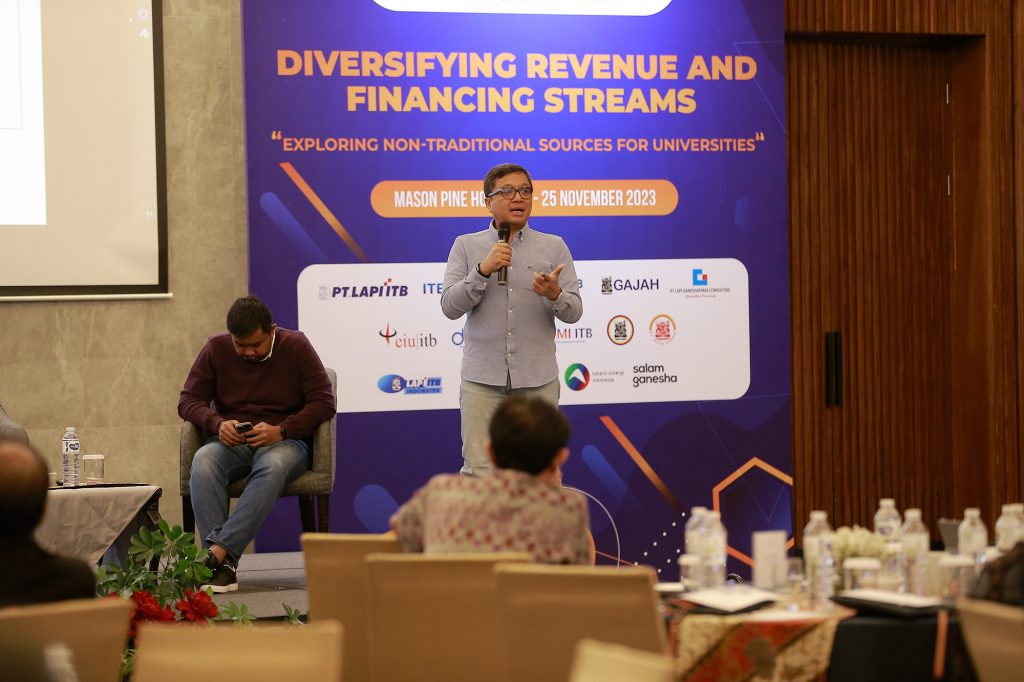
Widyasthana explained that investing in startups is not just about capital infusion but also about creating a symbiotic relationship where both entities benefit. For universities, this means tapping into the innovative potential and agility of startups to enhance their own operations and educational offerings. The synergy can lead to increased revenue opportunities, particularly from the connectivity and integration of new technologies and services.
He also suggested that universities can leverage their business units to utilize the products and services developed by these startups. This not only provides real-world testing and feedback for the startups’ offerings but also enables the universities to benefit from cutting-edge solutions, thus enhancing their operational efficiency and educational capabilities. This approach, according to Widyasthana, represents a more holistic view of investment, where the focus is on mutual growth and long-term value creation.
In the same session dedicated to exploring new business ventures in universities, another notable presentation was given by Andi Taufan Garuda Putra, CEO of Amartha. He shared his journey in steering Amartha, a startup now valued at 15 trillion, which plays a pivotal role in bridging the gap between rural communities and digital technology. Andi Taufan highlighted how Amartha has successfully harnessed digital solutions to address the unique challenges faced by rural areas. He detailed the startup’s approach to integrating advanced digital tools and platforms to improve access to essential services for these communities. This not only includes financial services but also educational resources, healthcare, and business support, demonstrating the transformative impact of digital technology at the grassroots level. His experience underscored the potential of startups to drive significant social change, especially in underserved regions. Andi Taufan’s insights provided a compelling case study on the value of innovative thinking and digital inclusivity, offering valuable lessons for universities looking to invest in startups and develop their own digital initiatives.
This seminar represents a significant milestone in the journey of BPUDL ITB. This event has successfully highlighted BPUDL’s proactive efforts to broaden its funding sources and refine its business strategies, crucial steps in adapting to the rapidly evolving landscape of higher education.
Through this seminar, BPUDL has demonstrated its commitment to embracing innovative approaches, whether through exploring public-private partnerships for infrastructure development, engaging with the dynamic world of startups, or leveraging digital transformation strategies. The insights shared by esteemed speakers and the collaborative spirit fostered among participants underscore ITB’s dedication to not only keeping pace with but also leading change in the educational sector.
